District of Columbia
Bet Mishpachah celebrates 50 years as D.C.’s LGBTQ synagogue
Oct. 25 ‘gay-la’ to honor and reflect on role as home for queer Jewish community
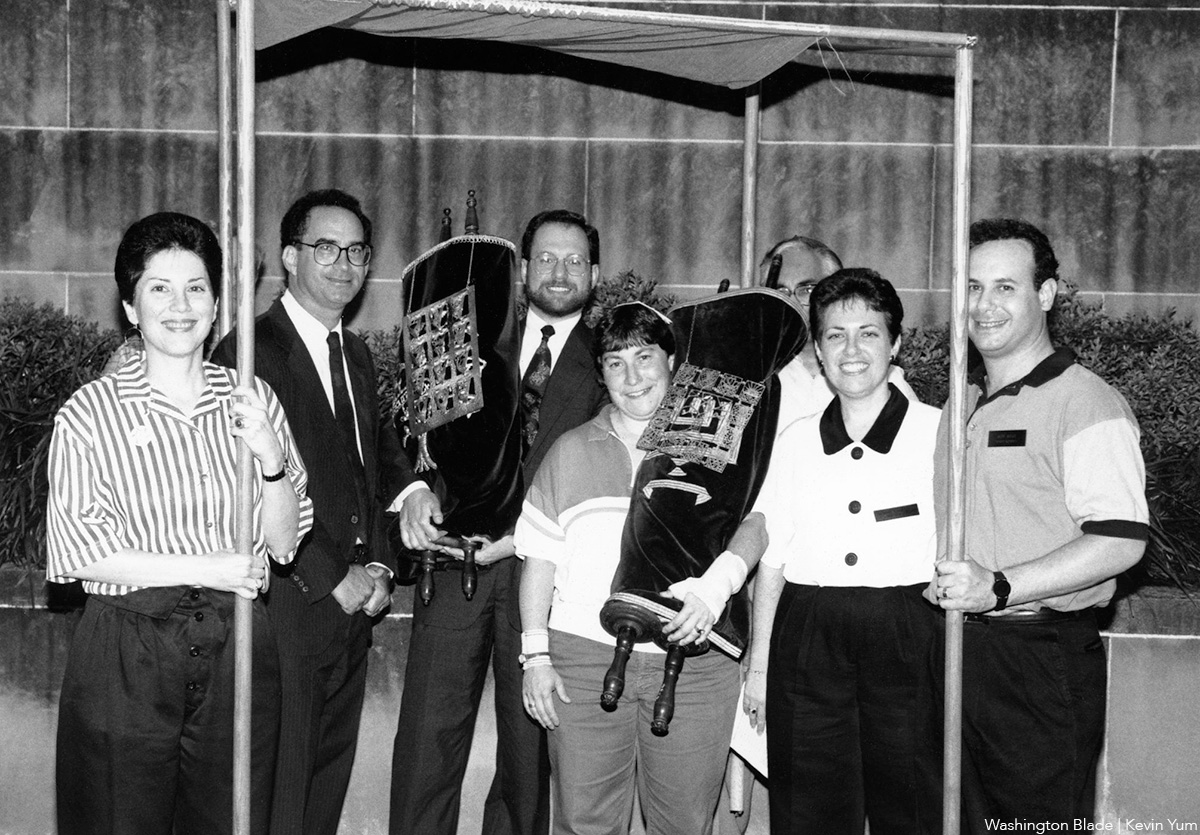
Leaders and members of Bet Mishpachah, D.C.’s LGBTQ synagogue, have been reflecting on the positive impact it has had on their lives as its 50th anniversary celebration on Oct. 25 is about to take place.
The anniversary celebration, to be held at the Washington Hebrew Congregation’s gathering hall at 3935 Macomb St., N.W., will honor Bet Mishpachah, among other things, for its role as a, “beacon of love, acceptance, and spiritual connection for LGBTQ+ Jews and allies in our nation’s capital and beyond,” according to a statement it released.
“Founded by a small group of visionaries, we quickly grew into a diverse and thriving community that has supported hundreds of individuals and families over the years,” the statement says. “From the early days of meeting in living rooms and small venues, to our current home in the heart of D.C., Bet Mishpachah has remained steadfast in its mission to offer a spiritual home for all who seek it,” the statement continues.
“Throughout these five decades, we have witnessed profound shifts in both Jewish life and LGBTQ+ rights, and we are proud to have played a role in advancing both,” it says.
Joshua Maxey, Bet Mishpachah’s current executive director, said the LGBTQ synagogue has about 190 members and holds its weekly Friday evening Shabbat services at the Edlavitch D.C. Jewish Community Center at 1529 16th St., N.W.
Longtime D.C. gay activist Joel Martin, who is one of Bet Mishpachah’s founding members, said like other founding members, he first learned about a fledgling D.C. gay Jewish group through an ad in the then Gay Blade monthly newspaper in 1975 or possibly 1974.
A Blade archives search shows that a small ad appeared in the April 1974 Gay Blade, which stated, “JEWISH GAYS of Greater Washington-Baltimore is forming to help gay Jewish people to develop social contacts. They also intend to do consciousness raising amongst the Jewish Community to the problems of gay people.” The ad included only a post office box number for people to obtain more information about the group. It did not have the name of the person who placed the ad.
In the July 1974 issue of the Gay Blade, an article titled “Gay and Jewish” appeared under the byline of authors Herb Gold and Jen Lib that talked about the group it identified as Jewish Gays of the Baltimore-Washington area.
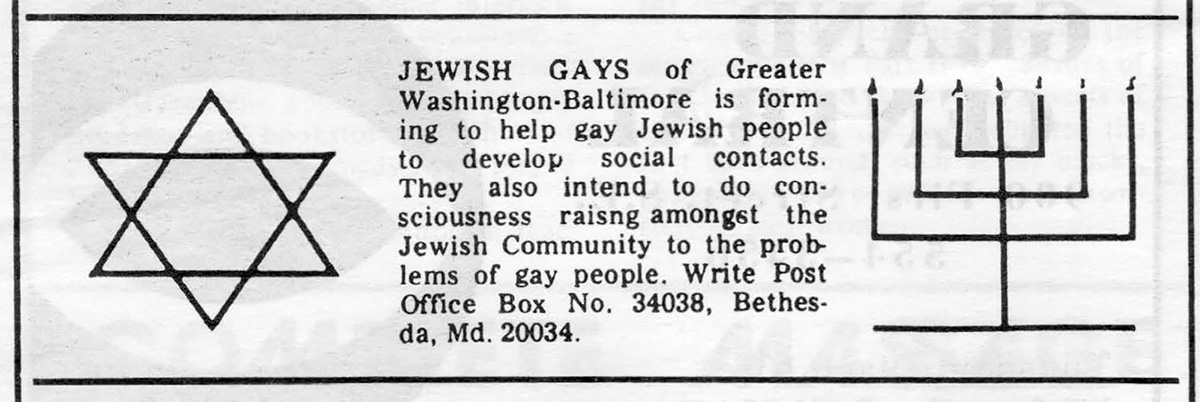
The article said the group had 35 members and that, “All members prefer that their gayness remain undisclosed for professional and personal reasons.”
Martin told the Washington Blade in an interview this week that he doesn’t recall whether the three or four men he met through the Gay Blade ad were part of this group. But he said they continued to meet at first in someone’s house or apartment in D.C. and decided on the name of Bet Mishpachah, which is a Hebrew phrase for “house of family.”
According to Martin, the group grew in numbers most likely due to additional ads or write-ups in the Gay Blade and soon began looking for a place to hold its meetings and services, which had been taking place in people’s homes. He said one place the group approached was the organization that had started the D.C. Jewish Museum. “And we were told to go away,” he said in recounting the response they received from what was then the Jewish Historical Society of Greater Washington.
Sarah Levitt, a spokesperson for what is now known as the D.C. Capital Jewish Museum, said the Jewish Historical Society at that time had a policy of not allowing on their premises “congregational services to anybody, so they declined the request on that basis.”
She added, “I can’t speculate on other reasons they might have said no. Certainly Joel and others felt a lot of cold shoulders from Jewish institutional life in that period.”
In a sign of how things have changed, the current Capital Jewish Museum at this time has a special exhibition entitled LGBTQ Jews in the Federal City that includes exhibits about Bet Mishpachah.
Martin said the fledgling Bet Mishpachah group soon was able to arrange to meet and hold its services at D.C.’s First Congregational Church at 10th and G Streets, N.W. Around that same time, First Congregational also allowed the Metropolitan Community Church of Washington, the city’s longtime LGBTQ Christian congregation, to hold its services at their church.
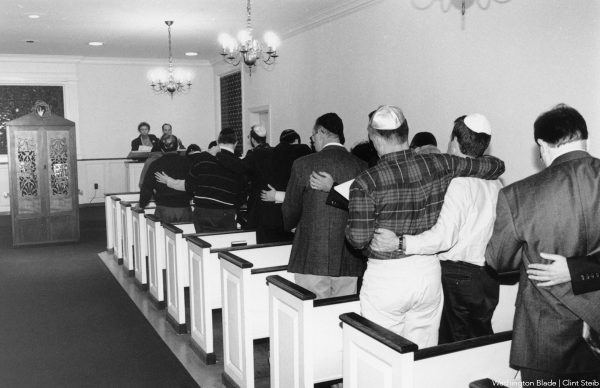
The Capital Jewish Museum’s LGBTQ exhibition shows that Bet Mishpachah held its services at First Congregational Church from 1976 through 1978, when it moved to Christ United Methodist Church along the city’s Southwest waterfront. The exhibition shows that in 1992, Bet Mishpachah moved its services to the National City Christian Church at Thomas Circle before moving in 1997 to its current location at the Jewish Community Center on 16th Street, N.W.
Bet Mishpachah has prepared a booklet to be handed out on Oct. 25 at the anniversary gala that includes statements from about 25 of its longtime members describing how the LGBTQ synagogue has impacted their lives in a positive way.
It also includes statements from Rabbi Bob Saks, Bet Mishpachah’s first rabbi, and Rabbi Jake Singer-Beili, its current rabbi.
“At the core of Bet Mishpachah’s founding was the idea that one should not have to hide one’s sexuality or identity in a Jewish space, and that all of us are created in the Divine image,” Singer-Beili said in his statement. “Its message was and is this: love is holy, the fullest expression of oneself is essential.”
He added, “We also proclaimed that we will celebrate these things as Jews and people who love Jews, in a dedicated Jewish space where everyone belongs. How awe-inspiring it is that we have made it to our 50th anniversary.”
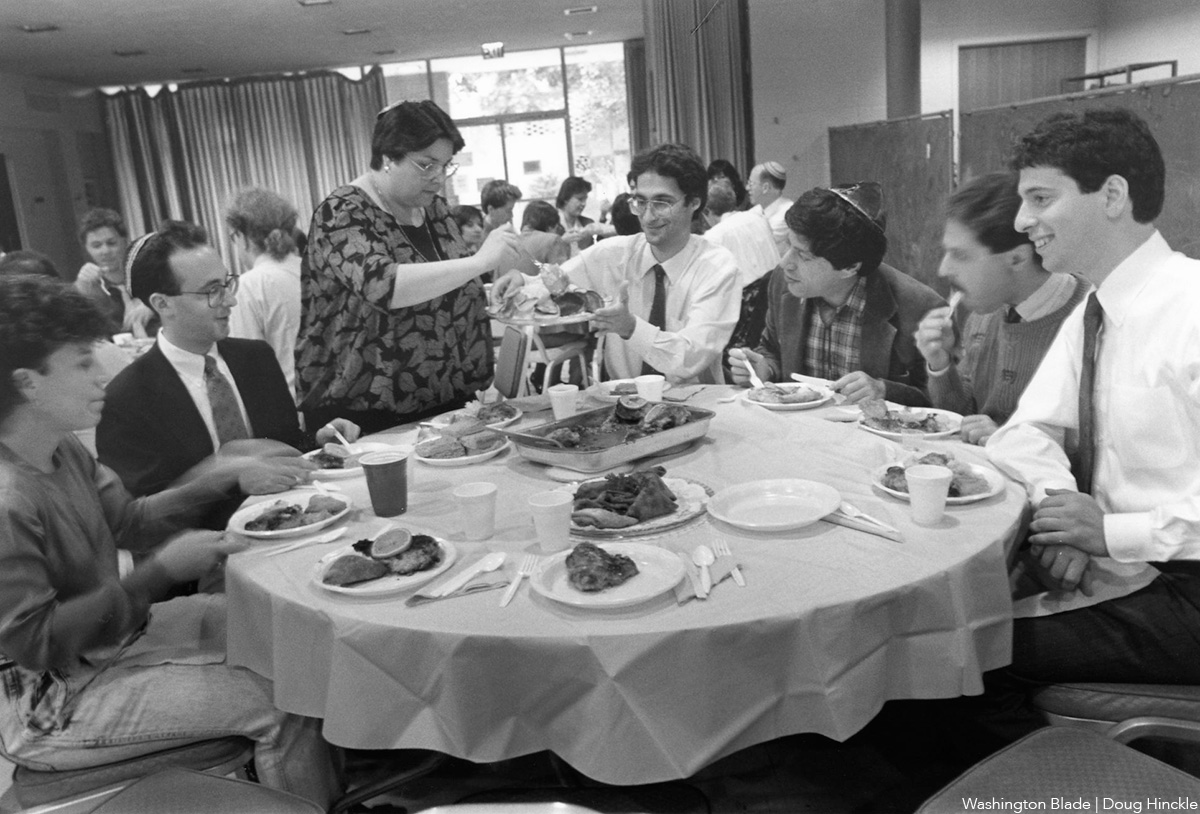
In his own statement, Bet Mishpachah’s current president, Joseph Pomper, expressed a sentiment like other members about how Bet Mishpachah has helped them reconcile their status as Jewish and LGBTQ.
“My history with Bet Mishpachah goes back to 1980 when I moved to Washington, D.C. to go to graduate school,” he stated. “I remember stumbling across an ad for the synagogue in the Washington Blade. I could not believe it was possible for there to be a place where I could be both LGBTQ+ and Jewish,” he said.
“While that may not seem like such a big deal today, back then it was hard to even imagine that a place where one could be both LGBTQ+ and Jewish actually existed,” he wrote. “After much deliberation, I finally summoned up the courage to go to services one Friday, mainly out of curiosity.”
He said he quickly became a regular member and moved later to take on leadership positions. “Perhaps most important, I found my community at Bet Mishpachah,” he wrote, adding that many of the people he met are an “amazing circle of friends” who “remain among my closest friends today, 45 years later.”
Longtime Bet Mishpachah member Stuart Sotsky, who wrote in his statement that he became involved with the group in 1975 as one of its founding members, told of the obstacles that Bet Mishpachah faced in its early years.
“With the major denominations still considering homosexuality as religiously prohibited and unacceptable, no synagogues accepted gay or lesbian people or relationships openly, and no synagogues would have sponsored or hosted our congregation in their facilities,” he wrote.
He told of how Bet Mishpachah evolved into a strong organization that developed ties to the wider Jewish community to fight for the rights of LGBTQ people in the faith community and the secular community. He said like the wider LGBTQ community, Bet Mishpachah members struggled to comfort those whose loved ones were lost during the height of the AIDS epidemic.
“Yet, as was true for the Jewish people wandering in the desert for forty years after the Exodus from Egypt, we were tested and strengthened as a community by our trials,” he wrote. “We not only survived but we were inspired toward social and political activism in the Gay and women’s liberation movement, and encouraged to risk coming out to our family, friends and co-workers,” he continued.
The statement released by Bet Mishpachah announcing its 50th anniversary gala celebration on Oct. 25 says the event would honor “visionary trailblazers,” including its Rabbi Emeritus Bob Saks and nationally acclaimed LGBTQ rights attorney Evan Wolfson, the founder of Freedom to Marry, the advocacy organization credited with leading the successful campaign to legalize same-sex marriage.
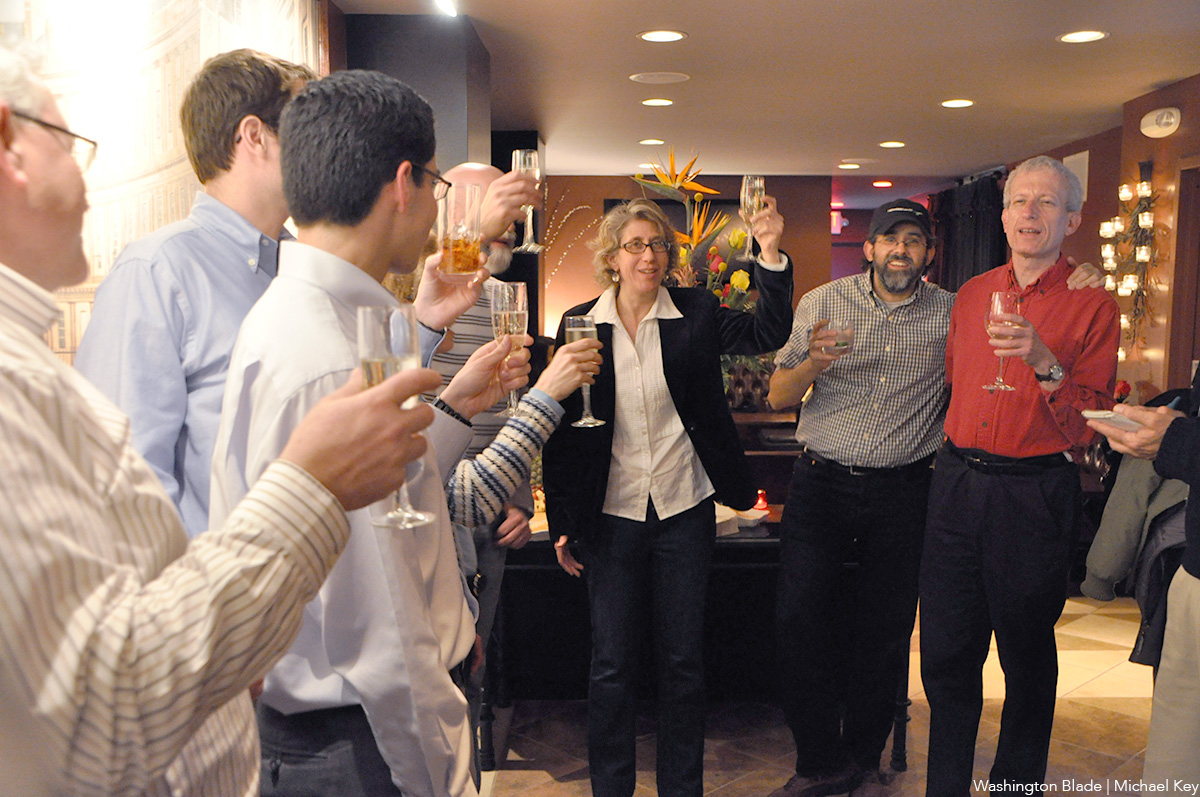
District of Columbia
D.C. police arrest man for burglary at gay bar Spark Social House
Suspect ID’d from images captured by Spark Social House security cameras

D.C. police on Feb. 18 arrested a 63-year-old man “of no fixed address” for allegedly stealing cash from the registers at the gay bar Spark Social House after unlawfully entering the bar at 2009 14th St., N.W., around 12:04 a.m. after it had closed for business, according to a police incident report.
“Later that day officers canvassing for the suspect located him nearby,” a separate police statement says. “63-year-old Tony Jones of no fixed address was arrested and charged with Burglary II,” the statement says.
The police incident report states that the bar’s owner, Nick Tsusaki, told police investigators that the bar’s security cameras captured the image of a man who has frequently visited the bar and was believed to be homeless.
“Once inside, the defendant was observed via the establishment’s security cameras opening the cash register, removing U.S. currency, and placing the currency into the left front pocket of his jacket,” the report says.
Tsusaki told the Washington Blade that he and Spark’s employees have allowed Jones to enter the bar many times since it opened last year to use the bathroom in a gesture of compassion knowing he was homeless. Tsusaki said he is not aware of Jones ever having purchased anything during his visits.
According to Tsusaki, Spark closed for business at around 10:30 p.m. on the night of the incident at which time an employee did not properly lock the front entrance door. He said no employees or customers were present when the security cameras show Jones entering Spark through the front door around 12:04 a.m.
Tsusaki said the security camera images show Jones had been inside Spark for about three hours on the night of the burglary and show him taking cash out of two cash registers. He took a total of $300, Tsusaki said.
When Tsusaki and Spark employees arrived at the bar later in the day and discovered the cash was missing from the registers they immediately called police, Tsusaki told the Blade. Knowing that Jones often hung out along the 2000 block of 14th Street where Spark is located, Tsusaki said he went outside to look for him and saw him across the street and pointed Jones out to police, who then placed him under arrest.
A police arrest affidavit filed in court states that at the time they arrested him police found the stolen cash inside the pocket of the jacket Jones was wearing. It says after taking him into police custody officers found a powdered substance in a Ziploc bag also in Jones’s possession that tested positive for cocaine, resulting in him being charged with cocaine possession in addition to the burglary charge.
D.C. Superior Court records show a judge ordered Jones held in preventive detention at a Feb. 19 presentment hearing. The judge then scheduled a preliminary hearing for the case on Feb. 20, the outcome of which couldn’t immediately be obtained.
District of Columbia
Judge rescinds order against activist in Capital Pride lawsuit
Darren Pasha accused of stalking organization staff, board members, volunteers

A D.C. Superior Court judge on Feb.18 agreed to rescind his earlier ruling declaring local gay activist Darren Pasha in default for failing to attend a virtual court hearing regarding an anti-stalking lawsuit brought against him by the Capital Pride Alliance, the group that organizes D.C.’s annual Pride events.
The Capital Pride lawsuit, initially filed on Oct. 27, 2025, accuses Pasha of engaging in a year-long “course of conduct” of “harassment, intimidation, threats, manipulation, and coercive behavior” targeting Capital Pride staff, board members, and volunteers.
In his own court filings without retaining an attorney, Pasha has strongly denied the stalking related allegations against him, saying “no credible or admissible evidence has been provided” to show he engaged in any wrongdoing.
Judge Robert D. Okum nevertheless on Feb. 6 approved a temporary stay-away order requiring Pasha to stay at least 100 feet away from Capital Pride’s staff, volunteers, and board members until the time of a follow-up court hearing scheduled for April 17. He reduced the stay-away distance from 200 yards as requested by Capital Pride.
In his two-page order issued on Feb. 18, Okun stated that Pasha explained that he was involved in a scooter accident in which he was injured and his phone was damaged, preventing him from joining the Feb. 6 court hearing.
“Therefore, the court finds there is a good cause for vacating the default,” Okun states in his order.
At the time he initially approved the default order at the Feb. 6 hearing that Pasha didn’t attend, Okun scheduled an April 17 ex parte proof hearing in which Capital Pride could have requested a ruling in its favor seeking a permanent anti-stalking order against Pasha.
In his Feb. 18 ruling rescinding the default order Okun changed the April 17 ex parte proof hearing to an initial scheduling conference hearing in which a decision on the outcome of the case is not likely to happen.
In addition, he agreed to consider Pasha’s call for a jury trial and gave Capital Pride 14 days to contest that request. The Capital Pride lawsuit initially called for a non-jury trial by judge.
One request by Pasha that Okum denied was a call for him to order Capital Pride to stop its staff or volunteers from posting information about the lawsuit on social media. Pasha has said the D.C.-based online blog called DC Homos, which Pasha claims is operated by someone associated with Capital Pride, has been posting articles portraying him in a negative light and subjecting him to highly negative publicity.
“The defendant has not set forth a sufficient basis for the court to restrict the plaintiff’s social media postings, and the court therefore will deny the defendant’s request in his social media praecipe,” Okun states in his order.
A praecipe is a formal written document requesting action by a court.
Pasha called the order a positive development in his favor. He said he plans to file another motion with more information about what he calls the unfair and defamatory reports about him related to the lawsuit by DC Homos, with a call for the judge to reverse his decision not to order Capital Pride to stop social media postings about the lawsuit.
Pasha points to a video interview on the LGBTQ Team Rayceen broadcast, a link to which he sent to the Washington Blade, in which DC Homos operator Jose Romero acknowledged his association with Capital Pride Alliance.
Capital Pride Executive Director Ryan Bos didn’t immediately respond to a message from the Blade asking whether Romero was a volunteer or employee with Capital Pride.
Pasha also said he believes the latest order has the effect of rescinding the temporary stay away order against him approved by Okun in his earlier ruling, even though Okun makes no mention of the stay away order in his latest ruling. Capital Pride attorney Nick Harrison told the Blade the stay away order “remains in full force and effect.”
Harrison said Capital Pride has no further comment on the lawsuit.
District of Columbia
Trans activists arrested outside HHS headquarters in D.C.
Protesters demonstrated directive against gender-affirming care

Authorities on Tuesday arrested 24 activists outside the U.S. Department of Health and Human Services headquarters in D.C.
The Gender Liberation Movement, a national organization that uses direct action, media engagement, and policy advocacy to defend bodily autonomy and self-determination, organized the protest in which more than 50 activists participated. Organizers said the action was a response to changes in federal policy mandated by Executive Order 14187, titled “Protecting Children from Chemical and Surgical Mutilation.”
The order directs federal agencies and programs to work toward “significantly limiting youth access to gender-affirming care nationwide,” according to KFF, a nonpartisan, nonprofit organization that provides independent, fact-based information on national health issues. The executive order also includes claims about gender-affirming care and transgender youth that critics have described as misinformation.
Members of ACT UP NY and ACT UP Pittsburgh also participated in the demonstration, which took place on the final day of the public comment period for proposed federal rules that would restrict access to gender-affirming care.
Demonstrators blocked the building’s main entrance, holding a banner reading “HANDS OFF OUR ‘MONES,” while chanting, “HHS—RFK—TRANS YOUTH ARE NO DEBATE” and “NO HATE—NO FEAR—TRANS YOUTH ARE WELCOME HERE.”
“We want trans youth and their loving families to know that we see them, we cherish them, and we won’t let these attacks go on without a fight,” said GLM co-founder Raquel Willis. “We also want all Americans to understand that Trump, RFK, and their HHS won’t stop at trying to block care for trans youth — they’re coming for trans adults, for those who need treatment from insulin to SSRIs, and all those already failed by a broken health insurance system.”
“It is shameful and intentional that this administration is pitting communities against one another by weaponizing Medicaid funding to strip care from trans youth. This has nothing to do with protecting health and everything to do with political distraction,” added GLM co-founder Eliel Cruz. “They are targeting young people to deflect from their failure to deliver for working families across the country. Instead of restricting care, we should be expanding it. Healthcare is a human right, and it must be accessible to every person — without cost or exception.”

Despite HHS’s efforts to restrict gender-affirming care for trans youth, major medical associations — including the American Medical Association, the American Academy of Pediatrics, and the Endocrine Society — continue to regard such care as evidence-based treatment. Gender-affirming care can include psychotherapy, social support, and, when clinically appropriate, puberty blockers and hormone therapy.
The protest comes amid broader shifts in access to care nationwide.
NYU Langone Health recently announced it will stop providing transition-related medical care to minors and will no longer accept new patients into its Transgender Youth Health Program following President Donald Trump’s January 2025 executive order targeting trans healthcare.
-

 National5 days ago
National5 days agoTrump falsely links trans people to terrorism
-

 Virginia5 days ago
Virginia5 days agoFellow lawmakers praise Adam Ebbin after Va. Senate farewell address
-

 National5 days ago
National5 days agoLGBTQ activists mourn the Rev. Jesse Jackson
-

 Massachusetts4 days ago
Massachusetts4 days agoEXCLUSIVE: Markey says transgender rights fight is ‘next frontier’

















